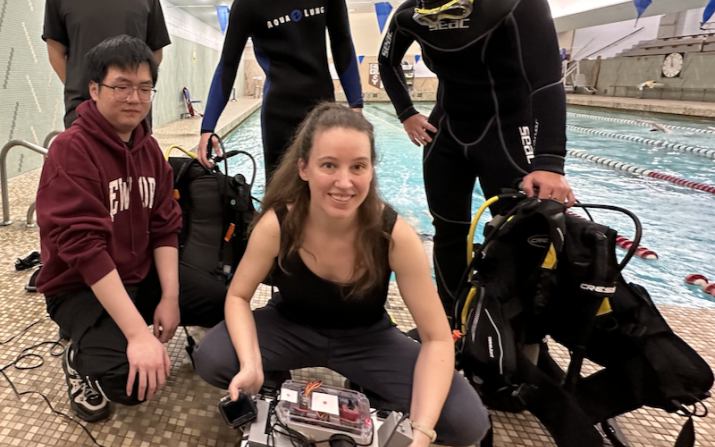Kathryn Daltorio's Crab Lab tests underwater robot in Veale Center swimming pool

Earlier this year, the Veale Convocation, Recreation and Athletic Center swimming pool was a testing site for Kathryn ‘Kati’ Daltorio’s Crab Lab thanks to a collaboration with the Motley Scuba Diving Club.
Supported by the Department of Defense, researchers in the Crab Lab, including PhD students Mingyu Pan and Yifeng Gong, are creating a waterproof crab robot that is capable of searching for and removing underwater un-exploded ordnance (UXO) in shallow water.
Because it’s underwater, the robot's sensors may not work perfectly, limiting its ability to communicate. Hung shared that the development of this type of robot is hard, but also rewarding.
“The coolest thing is when we make a breakthrough in the field of underwater legged robots and underwater manipulation,” he said. “Although legged robots are popular, most research only focuses on locomotion or manipulation on the ground. Few research groups developed legged robots underwater for many reasons.”
For the last year and a half, Gong has been designing the robot, working on the mechanical structure, simulating it on a computer and developing the controller, all while ensuring it is waterproof. Then, he put his work to the test when divers helped him submerge it under three meters of water in the Veale pool.
“I’m so glad it is functional after 20 minutes of the test and can also retrieve the UXO in the pool,” Hung revealed.
The testing happened in partnership with CWRU’s scuba team and Alexander Meylikhov. The divers, Meylikhov and Liam French, were responsible for filming the robot underwater and capturing its functionality while it retrieved the un-exploded IEDs.
“Diving alongside a machine was a surreal experience,” the sophomore mechanical engineering student shared. “It felt like we were contributing to pushing the boundaries of robotics.”
With a goal of the club to share their passion for diving and make the activity more accessible, Meylikhov thought collaborating with research teams would both assist researchers with projects, but also spark interest in scuba diving.
Meylikhov said that this first collaboration taught the team a significant lesson: that something they find enjoyable can also be leveraged to advance technology and potentially save lives in the future.
If any teams are interested in collaborating, they can reach out to Alex at axm1822@case.edu.

